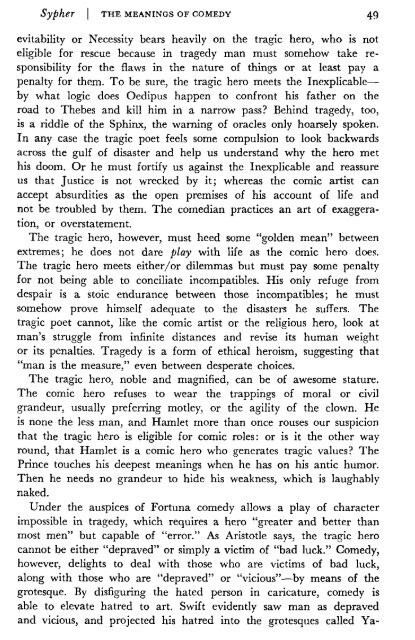The Meanings of Comedy* - Shakespeare Navigators
The Meanings of Comedy* - Shakespeare Navigators
The Meanings of Comedy* - Shakespeare Navigators
Create successful ePaper yourself
Turn your PDF publications into a flip-book with our unique Google optimized e-Paper software.
Sypher I rHe MEANINcs oF coMEDY<br />
49<br />
evitability or Necessity bears heavily on the tragic hero, who is not<br />
eligible for rescue because in tragedy man must somehow take responsibility<br />
for the flaws in the nature <strong>of</strong> things or at least pay a<br />
penalty for them. To be sure, the tragic hero meets the Inexplicableby<br />
what logic does Oedipus happen to confront his father on the<br />
road to <strong>The</strong>bes and kill him in a namow pass Behind tragedy, too,<br />
is a riddle <strong>of</strong> the Sphinx, the warning <strong>of</strong> oracles only hoarsely spoken.<br />
In any case the tragic poet feels some compulsion to look backwards<br />
across the gulf <strong>of</strong> disaster and help us understand why the hero met<br />
his doom. Or he must fortify us against the Inexplicable and reassure<br />
us that Justice is not wrecked by it; whereas the comic artist can<br />
accept absurdities as the open premises <strong>of</strong> his account <strong>of</strong> life and<br />
not be troubled by them. <strong>The</strong> comedian practices an art <strong>of</strong> exaggeration,<br />
or overstatement.<br />
<strong>The</strong> tragic hero, however, must heed some "golden mean" between<br />
extremes; he does not dare play with life as the comic hero does.<br />
<strong>The</strong> tragic hero meets either/or dilemmas but must pay some penalty<br />
for not being able to conciliate incompatibles. His only refuge from<br />
despair is a stoic endurance between those incompatibles; he must<br />
somehow prove himself adequate to the disasters he suffers. <strong>The</strong><br />
tragic poet cannot, like the comic artist or the religious hero, look at<br />
man's struggle from infinite distances and revise its human weight<br />
or its penalties. Tragedy is a form <strong>of</strong> ethical heroism, suggesting that<br />
"man is the measure," even between desperate choices.<br />
<strong>The</strong> tragic hero, noble and magnified, can be <strong>of</strong> awesome stature.<br />
<strong>The</strong> comic hero refuses to wear the trappings <strong>of</strong> moral or civil<br />
grandeur, usually preferring motley, or the agility <strong>of</strong> the clown. He<br />
is none the less man, and Hamlet more than once rouses our suspicion<br />
that the tragic hero is eligible for comic roles: or is it the other way<br />
round, that Hamlet is a comic hero who generates tragic values <strong>The</strong><br />
Prince touches his deepest meanings when he has on his antic humor.<br />
<strong>The</strong>n he needs no grandeur to hide his weakness, which is laughably<br />
naked.<br />
Under the auspices <strong>of</strong> Fortuna comedy allows a play <strong>of</strong> character<br />
impossible in tragedy, which requires a hero "greater and better than<br />
most men" but capable <strong>of</strong> "error." As Aristotle says, the tragic hero<br />
cannot be either "depraved" or simply a victim <strong>of</strong> "bad luck." Comedy,<br />
however, delights to deal with those who are victims <strong>of</strong> bad luck,<br />
along with those who are "depraved" or "yisieu5"-[y means <strong>of</strong> the<br />
grotesque. By disfiguring the hated person in caricature, comedy is<br />
able to elevate hatred to art. Swift evidently saw man as depraved<br />
and vicious, and projected his hatred into the grotesques called Ya-


